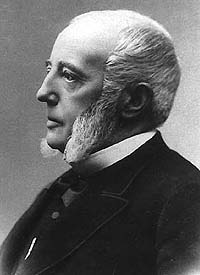René Goblet facts for kids
Quick facts for kids
René Goblet
|
|
|---|---|
 |
|
| Prime Minister of France | |
| In office 16 December 1886 – 30 May 1887 |
|
| President | Jules Grévy |
| Preceded by | Charles de Freycinet |
| Succeeded by | Maurice Rouvier |
| Personal details | |
| Born | 26 November 1828 Aire-sur-la-Lys |
| Died | 13 September 1905 (aged 76) Paris |
| Political party | None |
René Goblet (French pronunciation: [ʁəne ɡɔblɛ]; born November 26, 1828 – died September 13, 1905) was an important French politician. He served as the Prime Minister of France for a short time between 1886 and 1887.
Contents
Who Was René Goblet?
René Goblet was born in a town called Aire-sur-la-Lys in France. He studied law to become a lawyer. During a time known as the Second French Empire, he helped start a newspaper called Le Progrès de la Somme. This newspaper shared ideas about freedom and change.
In July 1871, people from his home area, the Somme, chose him to represent them. He joined the National Assembly, which is like a parliament. There, he was part of a group called the Republican Union. This group had more left-leaning ideas, meaning they often supported social equality and reforms.
Early Political Steps
René Goblet tried to get elected again in 1876 but did not win. However, he was elected the next year for the city of Amiens. He started taking on small government jobs in 1879.
In 1882, he became the Minister of the Interior. This job involves managing the country's police, local governments, and public safety. Later, in 1885, he became the Minister of Education, Fine Arts, and Religion. He held this role again in 1886. During this time, he became well-known for strongly defending the government's plans for education.
Leading France as Prime Minister
René Goblet was known for being very independent and speaking his mind. This sometimes caused disagreements with other politicians in his own party. He often had conflicts with his political partners throughout his career.
In December 1886, the government at the time fell apart. René Goblet then formed his own government, becoming the Prime Minister. He also kept the jobs of Minister of the Interior and Minister of Religion for himself. His government was not very popular from the start. It was even hard to find someone to be the Minister of Foreign Affairs, a job that finally went to Gustave Flourens.
The Schnaebele Incident
During his time as Prime Minister, a big event happened called the Schnaebele incident. A French official named Schnaebele was arrested at the German border. This caused a lot of anger and excitement in France. For a few days, Goblet did not make a clear decision. He let his Foreign Minister, Flourens, who wanted peace, argue with General Boulanger. Boulanger was the Minister of War and wanted to send a strong warning to Germany.
Even though Goblet eventually chose peace, his slow reaction to Boulanger's strong ideas was seen as a risk to the country. His government lost a vote on the budget in May 1887 and had to resign.
Later Career
René Goblet returned to government the next year. He became the Foreign Minister in a government led by Charles Floquet. In 1889, he lost his election to a candidate who supported General Boulanger.
From 1891 to 1893, he served in the Senate, which is another part of the French parliament. After that, he returned to the main chamber of parliament. He worked with other politicians like Édouard Locroy and Ferdinand Sarrien to create a plan for the country. They shared their ideas in a newspaper called La Petite République française.
In the elections of 1898, he was defeated again. After this, he was less involved in public life. René Goblet passed away in Paris in 1905.
Goblet's Government (1886–1887)
When René Goblet was Prime Minister, his main team included:
- René Goblet – Prime Minister, Minister of the Interior, and Minister of Worship
- Émile Flourens – Minister of Foreign Affairs
- Georges Boulanger – Minister of War (Defense)
- Albert Dauphin – Minister of Finance
- Ferdinand Sarrien – Minister of Justice
- Théophile Aube – Minister of Marine and Colonies (Navy and overseas territories)
- Marcellin Berthelot – Minister of Public Instruction and Fine Arts (Education and culture)
- Jules Develle – Minister of Agriculture
- Édouard Millaud – Minister of Public Works (Infrastructure)
- Félix Granet – Minister of Posts and Telegraphs (Communication)
- Édouard Lockroy – Minister of Commerce and Industry (Trade and business)
| Political offices | ||
|---|---|---|
| Preceded by René Waldeck-Rousseau |
Minister of the Interior 1882 |
Succeeded by Armand Fallières |
| Preceded by Armand Fallières |
Minister of Public Instruction 1885–1886 |
Succeeded by Marcelin Berthelot |
| Preceded by Félix Martin-Feuillée |
Minister of Worship 1885–1887 |
Succeeded by Eugène Spuller |
| Preceded by Charles de Freycinet |
Prime Minister of France 1886–1887 |
Succeeded by Maurice Rouvier |
| Preceded by Ferdinand Sarrien |
Minister of the Interior 1886–1887 |
Succeeded by Armand Fallières |
| Preceded by Émile Flourens |
Minister of Foreign Affairs 1888–1889 |
Succeeded by Eugène Spuller |
 | James B. Knighten |
 | Azellia White |
 | Willa Brown |

